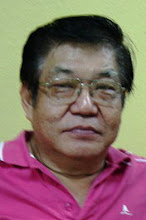Good news to be shared.......(as reported in thestar online)
KUALA LUMPUR: Papaya leaves and pegaga (centella asiatica) juice are a possible cure for dengue fever, a recent study revealed.
It has been reported that many people consume papaya leaves or pegaga juice to increase their platelet count after they contract dengue fever.
A recent study, conducted by a group of researchers from local and foreign universities, indicated that the powder from papaya leaves has substances responsible for the release and/or production of thrombocytes (platelets).
The study was initiated and led by Dr S. Kathiresan of AIMST University.
Dr Kathiresan said the leaves of papaya fruit were high in complex vitamins that might help bone marrow to rapidly increase blood platelet production.
“Dengue fever continues to be a major health threat to Malaysia after its first reported outbreak in 1902.
“The dengue virus’ main effect is on platelet production. Normally, a platelet in our body lasts for about five to 10 days and the body replenishes them when required,” he told Bernama.
“This virus destroys the body’s capacity to produce new platelets (during the period the virus is effective). The platelet count for a normal person varies from 150,000 to 250,000 per micro litre of blood. On becoming infected, a patient’s platelet count starts falling.
“A platelet count below 100,000 per microlitre is alarming – immediate medical attention is required. A platelet count below 50,000 can be fatal,” he added.
A fall in the platelet count prevents formation of clots and this leads to haemorrhaging, which results in both internal and external bleeding.
Once such bleeding starts, the situation is almost irreversible, he said.
Dr Kathiresan noted that interest in the papaya began with a simple experiment with papaya leaves which were ground and administered to mice.
The platelet counts before, and 72 hours after dosing, revealed they were significantly higher.
The six-month study, titled Thrombocyte counts in mice after the administration of papaya leaf suspension, published in October 2009, was funded by AIMST University and Universiti Sains Malaysia.
Dr Kathiresan was assisted in the study by Dr Surash Ramanathan, Dr Sharif M. Mansor and Dr Mas Rosemal M.H. Haris of Universiti Sains Malaysia, Penang, and Walther H. Wernsdorfer of Medical University of Vienna, Austria. — Bernama




No comments:
Post a Comment